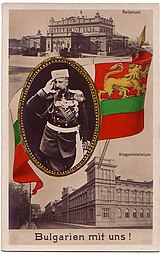Sliven prisoner of war camp
Internees suffered from the lack of proper housing conditions, typhus, malnutrition and ill treatment from their guards.
The 28 June 1914 assassination of Austro-Hungarian heir presumptive Archduke Franz Ferdinand precipitated Austria-Hungary's declaration of war against Serbia.
The conflict quickly attracted the involvement of all major European countries, pitting the Central Powers against the Entente coalition and starting World War I.
[1][2] After the entry of the Ottoman Empire into the war on the side of the Central Powers (November 1914), the decisive factor in the Balkans became the attitude of Bulgaria.
The Macedonian front was thus established in an effort to support the remnants of the Serbian army to conquer Vardar Macedonia.
The surrender of territory recently won with difficulty in the Second Balkan War was the last straw for many supporters of Liberal Party politician Eleftherios Venizelos.
In June 1917, the Venizelists gained full control of the country, immediately declaring war on the Central Powers and joining the Allied Army of the Orient operating on the Balkan Front.
The Greek entry into the war along with the 24 division reinforcements that the Army had received in the spring of the same year had created a strategic advantage for the Entente.
While the Plovdiv camp stood next to the Arda river and the weather was mild, the Haskovo lacked a supply of clean water.
A parallel influx of Serbian civilians from Morava necessitated the construction of a lesser camp, numbering 28 barracks.
An inspection by major general Mitiev in the same month led to the enactment of a 21-day incubation period in barracks where a sick prisoner was found.
The depot's commander second lieutenant Hristozov had not filled the necessary forms properly and claimed to be oblivious to the cause of the deaths, while having taken no precautionary measures against the epidemic.
[14] On 21 May 1921, Sliven's local council lamented the condition of the camp's graveyard, which held the remains of Serbian prisoners of war and interned civilians.
Bulgaria's official response to the enquiry stated that 3 people were arrested and 2 executed for their involvement in various violations of the rules of war.


